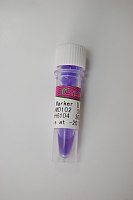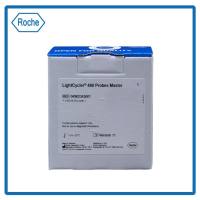Production of DNA Hybridization Probes with Digoxigenin-Modified Nucleotides by Random Hexanucleotide Priming
互联网
561
Oligolabeling using random hexanucleotide primers (1 ) is an effective method for producing DNA hybridization probes of high specific activity, although most previous variations have utilized radionuclides as the mechanism for modifying the incorporated nucleotides. With the development of nonradioactive detection methods, the detection is accomplished through the use of either avidin- or antidigoxigenin-alkaline phosphatase conjugates coupled with either a colorimetric or chemiluminescent reaction (2 ). Both of these strategies require the production of probes with biotin or digoxigenin modifications and demand the crafting of methods for incorporating these modified nucleotides into nucleic acid copies. We have experience with both types of modified probes and have found the digoxigenin-modified probes to be preferable in that they usually cause less nonspecific background signal.








